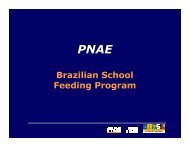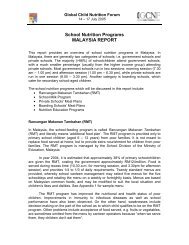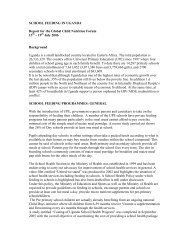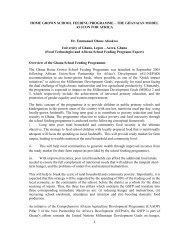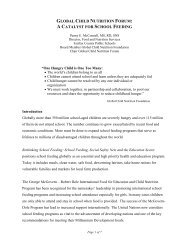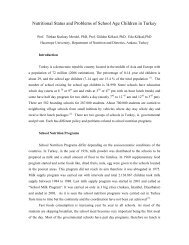EXECUTIVE SUMMARY - Global Child Nutrition Foundation
EXECUTIVE SUMMARY - Global Child Nutrition Foundation
EXECUTIVE SUMMARY - Global Child Nutrition Foundation
You also want an ePaper? Increase the reach of your titles
YUMPU automatically turns print PDFs into web optimized ePapers that Google loves.
Kenya’s Ministries of Health, Agriculture, and Education recently<br />
signed an agreement that acknowledges the role of proper<br />
nutrition in children’s growth and cognitive development.<br />
“Our interest in school feeding programs goes<br />
beyond the direct education benefits and looks<br />
at school feeding programs as part of a holistic<br />
school health initiative.”<br />
Hon. Dr. James Gesami, Assistant Minister of Public<br />
Health and Sanitation, Kenya<br />
These programs can also improve health habits in the<br />
broader community.<br />
Schools are at the heart of many communities. As a result, they<br />
provide entry points to educate the broader community about<br />
good health practices.<br />
When school feeding programs provide a variety of nutritious<br />
foods, they transform children’s eating habits. These habits are<br />
then transferred to parents and other family members.<br />
Direct community involvement in school feeding programs is also<br />
very important. When community members engage in food<br />
production, preparation, and serving, they become educated on<br />
good health and sanitation practices.<br />
The Ghana School Feeding Program has demonstrated<br />
important lessons about management and accountability.<br />
In 2005, the Ghana School Feeding Program (GSFP) was<br />
launched to enhance food security and reduce income variability<br />
for farmers. Each school day, 700,000 children in selected public<br />
primary schools are given one hot, nutritious meal prepared from<br />
locally grown foods. The objective is to spend 80% of the feeding<br />
costs in the local economy.<br />
The first phase of the GSFP has been extended to December<br />
2011 to conduct program evaluation and to design Phase Two<br />
of the program. Important lessons learned from Phase One<br />
include:<br />
Scaling Up Sustainability: Linking School Feeding with Agriculture<br />
Development to Maximize Food Security<br />
May 3-7, 2011<br />
Nairobi, Kenya<br />
© 2011 GCNF and PCD. All rights reserved. Page 8<br />
Robust management and accountability systems are essential.<br />
The program’s rapid growth was not accompanied by<br />
establishment of management and accountability systems. As<br />
a result, information sharing was inadequate between different<br />
levels of government. District and school decision makers<br />
were often unaware of program objectives and strategies.<br />
The program also did not adequately serve marginalized and<br />
deprived communities.<br />
Linkages between school feeding and agriculture development<br />
can be maximized. Baseline data from 69 districts shows that<br />
66.9% of service providers procure food from local farmers.<br />
The concentration of schools in Ghana’s two largest cities is<br />
one reason for this low percentage. The Minister of Local<br />
Government and Rural Development is encouraged, however,<br />
by government intervention which can maximize the use of<br />
local agricultural products in school feeding programs.<br />
To address these challenges, a Social Accountability Project<br />
(SAP) was established in 2009. This project is funded by the<br />
Dutch Embassy, the Government of Ghana, SNV, and SIGN<br />
(Schoolfeeding Initiative Ghana Netherlands). The goal is to<br />
improve program transparency, efficiency, and reach. A<br />
management system will be used to disseminate program<br />
information including policies, objectives, targets, financial<br />
resources, and results.<br />
In the GSFP’s second phase, further attention will be given to<br />
local food procurement, targeting criteria, and improved<br />
agricultural production. The Ministry of Local Government and<br />
Rural Development will recommend a national policy to govern<br />
the program.<br />
“We have realized at great cost, the importance<br />
of efficient and effective management and administrative<br />
systems, particularly for monitoring and<br />
evaluation aspects."<br />
Hon. Samuel Ofosu Ampofo, Minister of Local<br />
Government and Rural Development, Ghana



